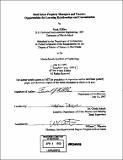| dc.contributor.advisor | Gloria Schuck. | en_US |
| dc.contributor.author | Killilea, Frank (Frank J.), 1964- | en_US |
| dc.contributor.other | Massachusetts Institute of Technology. Dept. of Architecture. | en_US |
| dc.date.accessioned | 2005-08-22T19:07:00Z | |
| dc.date.available | 2005-08-22T19:07:00Z | |
| dc.date.copyright | 1997 | en_US |
| dc.date.issued | 1997 | en_US |
| dc.identifier.uri | http://hdl.handle.net/1721.1/9535 | |
| dc.description | Thesis (S.M.)--Massachusetts Institute of Technology, Dept. of Architecture, 1997. | en_US |
| dc.description | Includes bibliographical references (leaves 95-99). | en_US |
| dc.description.abstract | Can the management of real estate assets profit from the value-added models developed by other industries? Current trends in the real estate industry have driven the need to develop methods for creating additional value on the property management end of the real estate business. These trends signal the shift from a growth industry to a mature industry. As real estate becomes a matme industry, real estate companies should review how other mature industries have created added value in their assets. The thesis reviews the current academic literature relating to customer relationships in industries other than real estate. From the review, a model is developed for customizing real estate services to meet the specific needs of individual tenants. 'The practice of a property management company is studied and tested against the model. Analysis of the research draws the conclusion that tenants do have unsatisfied needs. This creates t:m: opportunity to supply customized services to meet their demands. Providing customized services to tenants will only provide a strategic advantage to real estate if the customination results from systematically processing the information gamed through learning relationships with tenants. Tenants are reluctant to make an effort to build learning relationships. Property managers must overcome this resistance by translating the information that they gain about tenants into services the tenants value. | en_US |
| dc.description.statementofresponsibility | by Frank Killilea. | en_US |
| dc.format.extent | 99 leaves | en_US |
| dc.format.extent | 7010464 bytes | |
| dc.format.extent | 7010222 bytes | |
| dc.format.mimetype | application/pdf | |
| dc.format.mimetype | application/pdf | |
| dc.language.iso | eng | en_US |
| dc.publisher | Massachusetts Institute of Technology | en_US |
| dc.rights | M.I.T. theses are protected by copyright. They may be viewed from this source for any purpose, but reproduction or distribution in any format is prohibited without written permission. See provided URL for inquiries about permission. | en_US |
| dc.rights.uri | http://dspace.mit.edu/handle/1721.1/7582 | |
| dc.subject | Architecture. | en_US |
| dc.title | Real estate property managers and tenants : opportunities for learning relationships and customization | en_US |
| dc.type | Thesis | en_US |
| dc.description.degree | S.M. | en_US |
| dc.contributor.department | Massachusetts Institute of Technology. Department of Architecture | |
| dc.identifier.oclc | 43895985 | en_US |
